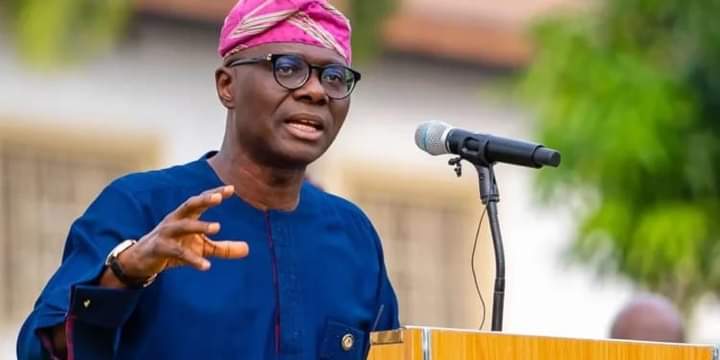Lagos Gov. Sanwolu commissions multi billion naira computer village Ikeja redline overpass head bridge
Lagos State Governor, Mr Babajide Sanwo-Olu, commissioned the Lagos Rail Mass Transit (LRMT) Red Line Ikeja Overpass Bridge on Tuesday, reiterating that his administration remains committed to “a transport system that is safe, sustainable, integrated, seamless, and with the potential to drive the socio-economic growth and development of the state and indeed Nigeria.”
Governor Sanwo-Olu, joined by his Kwara State counterpart and Chairman of the Nigerian Governors Forum (NGF), AbdulRahman AbdulRasak, made the pledge during the official commissioning of the Overpass Bridge. He stated that the overpass bridge, the fourth to be commissioned, signifies his government’s commitment to the safety of the people by developing a permanent solution to the recurring fatal vehicle/train accidents at railway crossings.
“The completion and formal commissioning of this safety infrastructure is a precursor to the commencement of passenger operations of the Red Line, which will be commissioned by our dear President, His Excellency, Asiwaju Bola Ahmed Tinubu, in the first quarter of next year.
“In the last four-and-a-half years of our administration, we have prioritized the implementation of our integrated transportation system under the traffic management and transportation pillar of the THEMES+ agenda.
“As a result, we have delivered life-enhancing transport infrastructures, which are making life easier for the average Lagosian,” he said.
“The LRMT Red Line Rail System, the first phase of which we project will move more than 500,000 passengers daily, stretches over a distance of 27 kilometres from Agbado to Oyingbo, with eight stations at Agbado, Iju, Agege, Ikeja, Oshodi, Mushin, Yaba, and terminates at Oyingbo,” he added.
Governor Sanwo-Olu affirmed that the current administration in Lagos State is committed to the goal of achieving a zero-carbon state, with the expectation of becoming an emission-neutral city by 2050. He mentioned that a total of 50 buses powered by Compressed Natural Gas would be deployed in 2024 as a pilot phase on defined corridors.
“We are piloting the use of buses powered by Compressed Natural Gas on defined corridors. We have only recently concluded the proof-of-concept phase in the deployment of electric vehicle buses to test their suitability for our environment.
“We will continue to work with the private sector on these initiatives for us to achieve a seamless integrated transport system befitting the economic nerve centre of Nigeria and the 5th largest economy in Africa,” he said.
Abimbola Akinajo, Managing Director/Chief Executive Officer (CEO) of Lagos Metropolitan Area Transport Authority (LAMATA), commended Governor Sanwo-Olu for laying the LRMT Red Line, noting that one of the highly essential components of the Red Line was the construction of five overpass bridges to separate vehicular and pedestrian traffic from train traffic.
“One of the highly essential components of the Red Line was the construction of five overpass bridges to separate vehicular and pedestrian traffic from train traffic.
“Today, the fourth of the five bridges will be opened to motorists to reduce congestion in the heart of the state capital,” she said.
She said that the 10-level crossings were identified along the LRMT Red Line rail corridor, over which overpass bridges should be built, adding that five were allocated to the Lagos State government and five others to the Federal Ministry of Transport.
Akinajo described the bridges as an essential part of the Lagos Rail Mass Transit (LRMT) Red Line rail project to ensure the safety of the people of Lagos, stating that the LRMT Red Line Ikeja Overpass Bridge has a total length of 620 meters.
She informed that the infrastructure to support the “operation of the 27-kilometre stretch representing the first phase LRMT Red Line rail, which is a 37-kilometre rail road, are already in place with stations and rail platforms built at Oyingbo, Yaba, Mushin, Oshodi, Ikeja, Agege, and Iju. By and large, the system is ready for test operation.”
Akinajo said that the Red Line, when opened for passenger operations, will tremendously improve the state GDP, adding: “The entire 37-kilometre Red line is expected to move more than one million passengers daily when fully operational.”
Besides, she said the train line will reduce congestion, emission and facilitate easy movement for commuters and goods.




